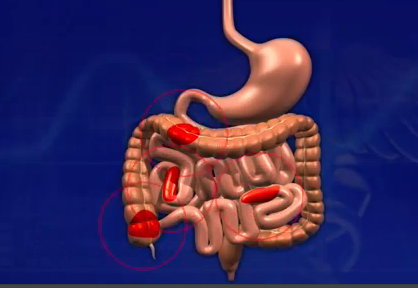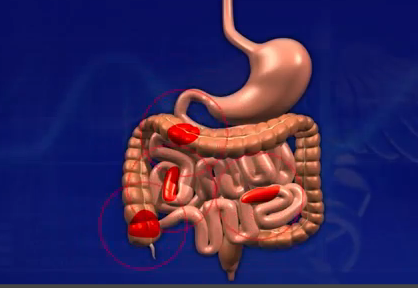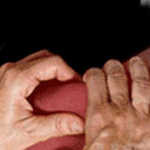inflammatory bowel disease (IBD). It causes inflammation and swelling of the inner walls ofthe digestive tract, resulting in diarrhea, stomach pain and malnutrition.
Sometimes, the inflammation caused by Crohn’s disease spreads deep into the tissues of the digestive tract and may cause painful colitis as well as other medical complications. It may cause debilitating and painful anomalies in the intestine which can be severe and dangerous. The inflammation due to Crohn’s disease can affect any part of intestine. However, it mostly affects the lower part of the small intestine called ileum, and the colon. The subsequent effects of the inflammation may affect the bowel wall and cause stenosis. Occasionally, the inflammation can spread through the bowel wall and cause fistula. The signs of Crohn’s disease may appear slowly or suddenly; and can be mild or severe.

Symptoms of Crohn’s disease
The following are some of the symptoms of Crohn’s disease:
- Stomach pain and cramping:The intestine may swell up due to inflammation and thicken with scar tissues, thereby blocking the passage of intestinal tract. The blockage may lead to the cramps and pain.
- Diarrhea:It is caused due to the excess secretion of water and salt by the affected portion of the intestine, and the inability of the colon to absorb the excess secretion.
- Ulcers:Sores and ulcersare caused in intestinal walls. The patient may also experience mouth ulcers like crank sores.
- Weight loss and loss of appetite: Inflamed digestive tract can result in lack of appetite and consequently loss of weight.
- Blood in stool:The inflamed tissues in the intestinal tract may cause bleeding,which gets eliminated with the stool. Sometimes such bleeding may go unnoticed.
The following are the other signs experienced by severely affected Crohn’s disease patients:
- Eye inflammation
- Mouth sores
- Fever
- Fatigue
- Inflammation of bile ducts, and liver
- Arthritis
- Delay in growth for children
- Skin disorders
Causes of Crohn’s disease
Presently the exact cause for Crohn’s disease is unknown. Doctors believe that diet and stress can enhance an already existing case of Crohn’s disease, but it itself does not cause the disease.Researchers believe that along with many other factors, immune system disordersand the heredity aspectsplay an important role in the development of the disease.
- Heredity:Crohn’s disease is more common in patients from a family which has history of the condition.It may however be noted that most patients do not have a family history.
- Immune system: It is believed that the immune system’s abnormalattack of cells in the digestive tract, in response to a virus or bacterial attack may also possibly lead to development of Crohn’s disease.

Treatments of Crohn’s disease
As there is no cure for Crohn’s disease, varied medications are given for different Crohn’s disease patients. The aim of treatment is to reduce the inflammation and limit the complications. Normally, the treatment involves drugs and in few cases surgery.
The following are some of the anti-inflammatory drugs used for Crohn’s disease:
- Corticosteroids: It reduces inflammation, but withside effects such as, high blood pressure, glaucoma, diabetes, cataracts, osteoporosis, bone fractures, infections, puffy face, night sweats, insomnia, and excessive hair on face.Excess use may affect the normal growth of children.New type of corticosteroids like budesonide works faster to provide relief with fewer side effects.It is for short term use and can be used along with immune suppressors for inducing and maintaining the remission.
- Mesalamine: Effective only for colonanomalies and causes lesser side effects.
- Salfasalazine: This drug is not always effective except in some cases of Crohn’s disease affecting the colon. This drug has many side effects such as vomiting, headache, nausea, and heart burn.
Immune system suppressors:These drugs suppress the immune response and reduce the inflammation. For better results,it is used in combination with other drugs. The following are some of the immune suppressor drugs:
- Adalimumab
- Certolizumab pegol
- Cyclosporine. The side effects are serious such as damages to liver, kidney, seizures, and fatal infections.
- Mercaptopurine and Azathioprine.
- Infliximab.Tuberculosis and other infections are associated with this drug. Patients suffering from cancer, heart, multiple sclerosis should not take this drug.
- Methotrexate.
- Natalizumab.Serious side effects include brain infection, or severe disability.
Above drugs are used when other medicines fail, but are associated with increased risk to cancer and other side effects.
Antibiotics: Antibiotics reduces the drainage, heals fistulas, reduces harmful bacteria, and suppresses the intestine’s immune system. Metronidazole and Ciprofloxacin are some of the antibiotics that are prescribed. The side effects are numbness,tingling of hands and feet, muscle pain, weakness, and tendon rupture.
Other medications: Prescribed for controlling the inflammation and to reduce the symptoms.
- Anti-diarrheals, such as psyllium powder, methylcellulose
- Laxatives
- Pain relievers like acetaminophen. Avoid aspirin, naproxen, and ibuprofen.
- Iron supplements
- Assisted nutrition intake
- Vitamin B-12
- Calcium and vitamin D
Surgery:When medicines fail,the doctor may recommend operation for removing the damaged portion.


